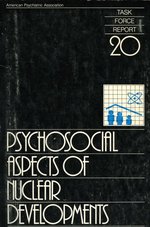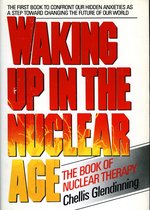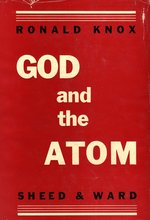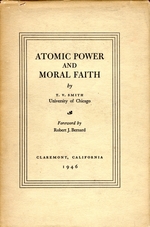The field of human psychology was at a crossroads at the end of World War II. Freudian psychoanalysis was being challenged by behaviorists John B. Watson and B. F. Skinner, leading to a major schism within the field. But despite their theoretical differences, both parties were fascinated by human drives - especially fear.
The atomic bomb proved to be a fascinating lens through which the human mind could be studied. Research programs were launched to allow psychologists and sociologists to examine and catalogue the effects of the atomic age on the collective psyche.1 Several large-scale surveys were conducted to gauge the American understanding and attitude towards both peaceful and military atomic energy. Perhaps the most extensive of these surveys was given in 1947, less than two years after the attacks on Japan.23
Others, often those who felt that science had finally forsaken the human race, turned to religion for guidance and meaning. Sacred texts were examined for references to enormous weapons or impending disasters in the hope that they might provide reassurance or guidance.45 At the same time, theologians worked to justify a world in which divinity and nuclear destruction could coexist.6
An entire subgenre of literature appeared to aid individuals with the transition from a pre-atomic to an atomic world.7 These books and articles often dealt with questions of personal meaning, death and inevitability, and overcoming fear. Philosophers and moralists too, found themselves drawn to atomic energy.8 The questions of just use, the right to violence, and escalation of conflict proved difficult topics which academicians debated vigorously in scholarly publications.910
Perhaps unsurprisingly, few answers were to be had and contradictions abounded. The people, experts said, were scared and worried by the bomb, but were hopeful that science and technology would improve their lives. Some theologians claimed the bomb to be divine intervention while others called it an abomination. Philosophers and psychologists argued endlessly over moral obligations and the necessity of empathy. Likewise, members of the American public picked and chose among these arguments or dismissed them wholesale, fashioning their own means of coping with the threat of nuclear war.
Notes
- 2657. Ikle, Fred Charles. The Social Impact of Bomb Destruction. Norman: U. of Oklahoma Press, 1958. UA926 .I5. Return to text ↑
- 2647. Fisher, Burton R., Charles A. Metzner & Benjamin J. Darsky. Men>Public Response to Peacetime Uses of Atomic Energy. A Study of People Reactions and Information Based on a Sample Interview Survey in Comparable Communities with and without Major Atomic Energy Activities. Ann Arbor: University of Michigan Survey Research Center, 1951. TK9153 .M5 1951. Return to text ↑
- 2641. Cornell University, Ithaca, New York. Public Reaction to the Atomic Bomb and World Affairs. A Nation-wide Survey of Attitudes and Information. Ithaca: Cornell University, April 1947. HD9743.U6 S6 1947. Return to text ↑
- 2640. Chesnut, D. Lee. The Atom Speaks - and Echoes the Word of God. Grand Rapids; Wm. B. Eerdmans, 1951. BR115.A85 C5 1951. Return to text ↑
- 2654. Haynes, Carlyle B. When God Splits the Atom. An Explanation of the Meaning of the Discovery and the Principles of Nuclear Fission in the Light of the Ancient Prophecies of the Bible. Nashville: The Southern Publishing Association, 1946. BS649.E55 H3 1946. Return to text ↑
- 2644. Dressner, Samuel H. God, Man and Atomic War. New York: Living Books, 1966. BR115.A85 D7 1966. Return to text ↑
- 2649. Glendinning, Chellis. Waking Up in the Nuclear Age. The Book of Nuclear Therapy. New York: Beech Tree Books, 1987. TK9153 .G55 1987. Return to text ↑
- 2683. Smith, T.V. Atomic Power and Moral Faith. Claremont: Claremont College, 1946. JX1954 .S5. Return to text ↑
- 2664. Lifton, Robert Jay & Richard Falk. Indefensible Weapons. The Political and Psychological Case Against Nuclearism. New York: Basic Books, 1982. UF767 .L53 1982. Return to text ↑
- 2672. Nuclear Rights/Nuclear Wrongs. Eds. Ellen Frankel Paul, Fred D. Miller Jr., Jeffrey Paul & John Ahrens. Oxford: Blackwell for the Social Philosophy and Policy Center, Bowling Green State University, 1986. U263 .N759 1986. Return to text ↑




